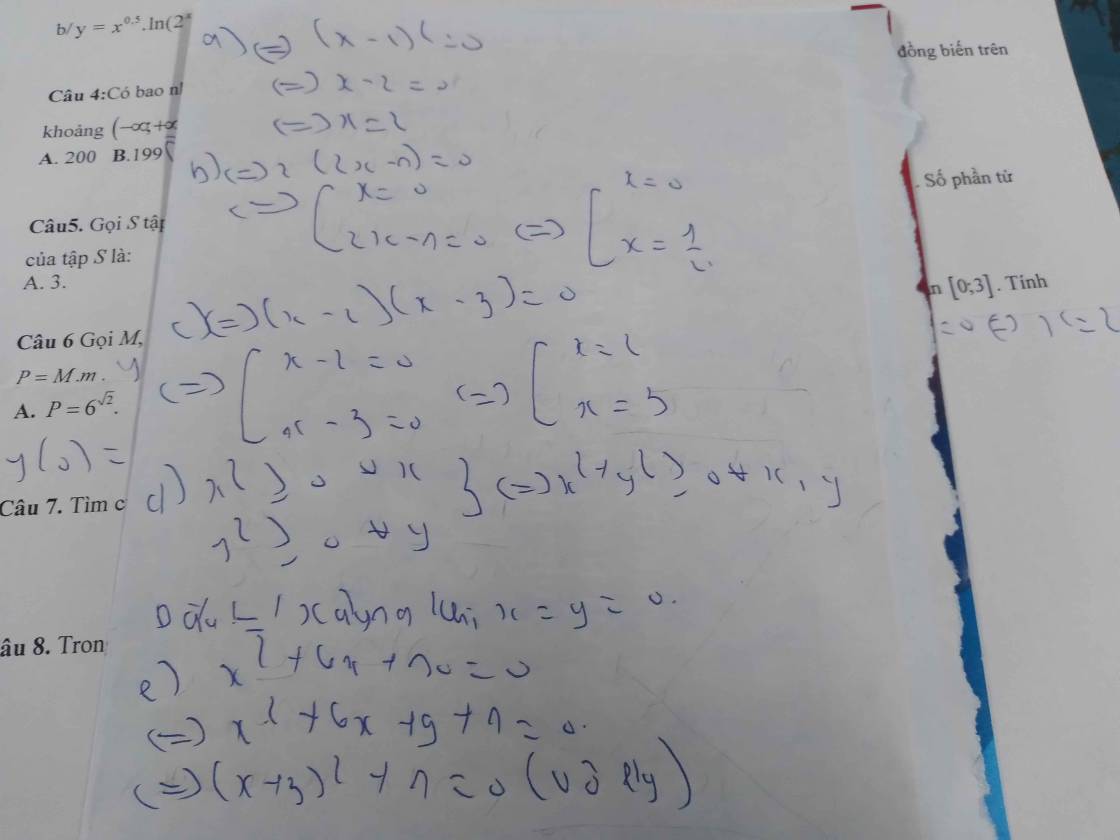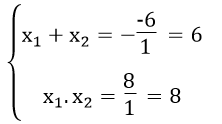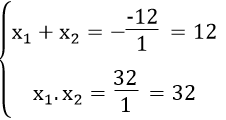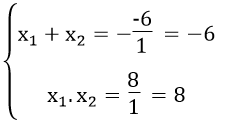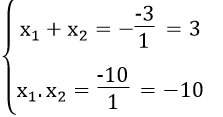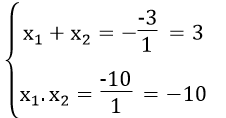√x2-6x+10
LN
Những câu hỏi liên quan
Giải phương trình: (x2- 6x + 9)2- 15(x2 - 6x + 10) = 1
Giải phương trình: (x2- 6x + 9)2- 15(x2 - 6x + 10) = 1
Giải phương trình:
a)x2-4x+4
b)2x2-x
c)x2-5x+6
d)x2+y2
e)x2+6x+10
Đề thiếu vế phải rồi bạn
Đúng 0
Bình luận (1)
Giải PT
a) x3+(x-5)(x+8)= 2x2-37
b)x(x-1)(x+1)(x+2)=24
c)(x2-6x+9)-15(x2-6x+10)=
a)
\(x^3+\left(x-5\right)\left(x+8\right)=2x^2-37\\ \Leftrightarrow x^3+x^2+3x-40=2x^2-37\\ \Leftrightarrow x^3-x^2+3x-3=0\\ \Leftrightarrow x^2\left(x-3\right)+3\left(x-3\right)=0\\ \Leftrightarrow\left(x^2+3\right)\left(x-3\right)=0\)
Vì \(x^2+3\ge3>0\Rightarrow x-3=0\\ \Leftrightarrow x=3\)
b)
\(x\left(x-1\right)\left(x+1\right)\left(x+2\right)=24\\ \Leftrightarrow\left[x\left(x+1\right)\right]\left[\left(x-1\right)\left(x+2\right)\right]=24\\ \Leftrightarrow\left(x^2+x\right)\left(x^2+x-2\right)=24\)
Đặt \(x^2+x=y\)
\(\Rightarrow y\left(y-2\right)=24\\ \Leftrightarrow y^2-2y+1=25\\ \Leftrightarrow\left(y-1\right)^2=25\\ \Leftrightarrow\left[{}\begin{matrix}y-1=5\\y-1=-5\end{matrix}\right.\\ \Leftrightarrow\left[{}\begin{matrix}y=6\\y=-4\end{matrix}\right.\)
Nếu y = 6
\(\Rightarrow x^2+x=6\\ \Leftrightarrow x^2+x-6=0\\ \Leftrightarrow x^2+2x-3x-6=0\\ \Leftrightarrow x\left(x+2\right)-3\left(x+2\right)=0\\ \Leftrightarrow\left(x-3\right)\left(x+2\right)=0\\ \Leftrightarrow\left[{}\begin{matrix}x-3=0\\x+2=0\end{matrix}\right.\\ \Leftrightarrow\left[{}\begin{matrix}x=3\\x=-2\end{matrix}\right.\)
Nếu y = -4
\(\Rightarrow x^2+x=-4\\ \Leftrightarrow x^2+x+\dfrac{1}{4}=-4+\dfrac{1}{4}\\ \Leftrightarrow\left(x+\dfrac{1}{2}\right)^2=-\dfrac{15}{4}\)
Mà \(\left(x+\dfrac{1}{.2}\right)^2\ge0>-\dfrac{15}{4}\)
`=> Loại`
c) Vế còn lại là bao nhiêu?
Đúng 2
Bình luận (1)
chứng minh bất đẳng thức sau
x2 + 6x +9 > 0
x2 + 6x + 10 > 1
a.x2+6x+9>0
(x+3)2>0
Vậy đẳng thức trên đúng
b. x2+6x+10>1
x2+6x+9+1>1
(x+3)2>0
Vậy đẳng thúc trên đúng
Đúng 0
Bình luận (0)
a)\(x^2+6x+9\)
\(\Rightarrow\left(x^2+2.2x.3+3^2\right)\)
\(\Rightarrow\left(x+3\right)^2>0\)
b)\(x^2+6x+10\)
\(\left(x^2+2.2x.3+3^2\right)+1\)
\(\Rightarrow\left(x+3\right)^2+1>1\left(vì\left(x+3\right)^2>0\right)\)
Đúng 0
Bình luận (0)
Giải phương trình:
a)x2-4x+4=0
b)2x2-x=0
c)x2-5x+6=0
d)x2+y2=0
e)x2+6x+10=0
\(a.x^2-4x+4=0\)
\(\left(x-2\right)^2=0\)
=>x=2
b) \(2x^2-x=0\)
\(x\left(2x-1\right)=0\)
=> \(\left[{}\begin{matrix}x=0\\x=\dfrac{1}{2}\end{matrix}\right.\)
c) \(x^2-5x+6=0\)
\(x^2-2x-3x+6=0\)
\(\left(x-2\right)\left(x-3\right)=0\)
=> \(\left[{}\begin{matrix}x=2\\x=3\end{matrix}\right.\)
d) \(x^2+y^2=0\)
Vì \(x^2,y^2\ge0\forall x,y\)
=>x=y=0
e) \(x^2+6x+10=0\)
\(\left(x+3\right)^2+1=0\)
Vì \(\left(x+3\right)^2\ge0\forall x\)
=> VT>0 \(\forall x\)
=> phương trình vô nghiệm
Đúng 3
Bình luận (0)
a) \(x^2-4x+4=0\)
\(\Leftrightarrow\left(x-2\right)^2=0\)
\(\Leftrightarrow x-2=0\)
\(\Leftrightarrow x=2\)
b) \(2x^2-x=0\)
\(\Leftrightarrow x\left(2x-1\right)=0\)
\(\Leftrightarrow\left[{}\begin{matrix}x=0\\2x-1=0\end{matrix}\right.\) \(\Leftrightarrow\left[{}\begin{matrix}x=0\\x=\dfrac{1}{2}\end{matrix}\right.\)
c) \(x^2-5x+6=0\)
\(\Leftrightarrow\left[{}\begin{matrix}x=2\\x=3\end{matrix}\right.\) \(\left(a+b+c=0\right)\)
d) \(x^2+y^2=0\)
\(\Leftrightarrow\left\{{}\begin{matrix}x^2=0\\y^2=0\end{matrix}\right.\) \(\Leftrightarrow\left\{{}\begin{matrix}x=0\\y=0\end{matrix}\right.\)
e) \(x^2+6x+10=0\)
\(\Leftrightarrow x^2+6x+9+1=0\)
\(\Leftrightarrow\left(x+3\right)^2+1=0\left(1\right)\)
mà \(\left(x+3\right)^2+1\ge1>0,\forall x\in R\)
Nên phương trình (1) vô nghiệm
Đúng 0
Bình luận (0)
ùng hệ thức Vi-ét để tính nhẩm nghiệm của các phương trình:
a. x2-6x +8=0 b.x2 -12x + 32 =0
c. x2 +6x +8 =0 d.x2 -3x -10 =0
e. x2 +3x -10 =0
a. Ta có: Δ’ = (-3)2 -1.8=9 -8 =1 > 0
Phương trình có 2 nghiệm phân biệt
Theo hệ thức Vi-ét ta có:
Giải ra ta được x1 =2, x2 =4
b. Ta có: Δ’ = (-6)2 -1.32 = 36 - 32 = 4 > 0
Phương trình có 2 nghiệm phân biệt
Theo hệ thức Vi-ét ta có:
Giải ra ta được x1 =4,x2 =8
c. Ta có: Δ’ = 32 -1.8=9 -8 =1 > 0
Phương trình có 2 nghiệm phân biệt
Theo hệ thức Vi-ét ta có:
Giải ra ta được x1 =-2, x2 =-4
d. Ta có: Δ = (-3)2 -4.1.(-10)=9 +40 =49 > 0
Phương trình có 2 nghiệm phân biệt
Theo hệ thức Vi-ét ta có:
Giải ra ta được x1 =-2, x2 =5
e. Ta có: Δ = 32 -4.1.(-10)=9 +40 =49 > 0
Phương trình có 2 nghiệm phân biệt
Theo hệ thức Vi-ét ta có:
Đúng 0
Bình luận (0)
1) (x2-4x+16) (x+4)-x(x+1) (x+2)+3x2=0
2) (8x+2) (1-3x)+(6x-1) (4x-10)=-50
3) (x2+2x+4) (2-x)+x(x-3) (x+4)-x2+24=0
4) (\(\dfrac{x}{2}\)x2+3) (5-6x)+(12x-2) (\(\dfrac{x}{4}\)x4+3)=0
1)(x2-4x+16)(x+4)-x(x+1)(x+2)+3x2=0
\(\Rightarrow\)(x3+64)-x(x2+2x+x+2)+3x2=0
\(\Rightarrow\)x3+64-x3-2x2-x2-2x+3x2=0
\(\Rightarrow\)-2x+64=0
\(\Rightarrow\)-2x=-64
\(\Rightarrow\)x=\(\dfrac{-64}{-2}\)
\(\Rightarrow x=32\)
Đúng 1
Bình luận (0)
2)(8x+2)(1-3x)+(6x-1)(4x-10)=-50
\(\Rightarrow\)8x-24x2+2-6x+24x2-60x-4x+10=50
\(\Rightarrow\)-62x+12=50
\(\Rightarrow\)-62x=50-12
\(\Rightarrow\)-62x=38
\(\Rightarrow\)x=\(-\dfrac{38}{62}=-\dfrac{19}{31}\)
Đúng 1
Bình luận (0)
3)(x2+2x+4)(2-x)+x(x-3)(x+4)-x2+24=0
\(\Rightarrow\)8-x3+x(x2+4x-3x-12)-x2+24=0
\(\Rightarrow\)8-x3+x3+4x2-3x2-12x-x2+21=0
\(\Rightarrow\)-12x+29=0
\(\Rightarrow\)-12x=-29
\(\Rightarrow\)x=\(\dfrac{-29}{-12}=\dfrac{29}{12}\)
Đúng 1
Bình luận (0)
Số nghiệm của phương trình x 2 + 6 x + 10 = 0
A. 1
B. 2
C. 0
D. Vô nghiệm
Chứng tỏ rằng: x 2 – 6x + 10 > 0 với mọi x
Ta có: x 2 – 6x + 10 = x 2 – 2.x.3 + 9 + 1 = x - 3 2 + 1
Vì x - 3 2 ≥ 0 với mọi x nên x - 3 2 + 1 > 0 mọi x
Vậy x 2 – 6x + 10 > 0 với mọi x.(đpcm)
Đúng 0
Bình luận (0)







